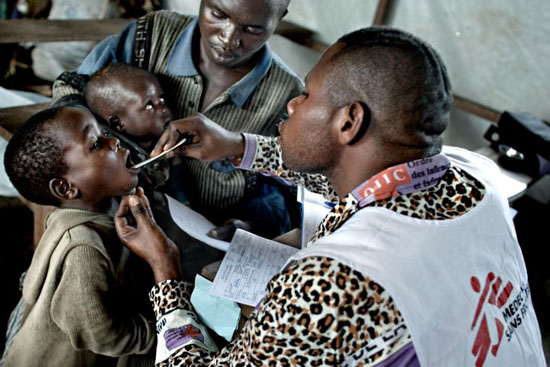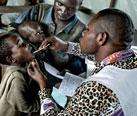MSF is continuing to work in Goma and in other towns and villages in the province of North Kivu in the Democratic Republic of Congo. The organization remains very concerned about the tens of thousands of people still on the move who have fled the recent fighting. Without improvements in the security situation, people will be forced to continue running.
UPDATE: November 6, 2008
Since fighting broke out in and around the town of Kiwanja on November 5th and 6th, Doctors Without Borders/Médecins Sans Frontières (MSF) surgical teams have treated more than 50 wounded people in the MSF-supported hospital in the neighboring town of Rutshuru. Thousands of people who have fled the fighting in Kiwanja have sought shelter on the road between the two towns, in churches, and even inside Rutshuru hospital.

© Espen Rasmussen
A displaced Congolese child is examined at an MSF mobile clinic outside of Goma in North Kivu where large numbers of displaced people are camped.
Doctors Without Borders/Médecins Sans Frontières (MSF) is continuing to work in Goma and in other towns and villages in the province of North Kivu in the Democratic Republic of Congo. The organization remains very concerned about the tens of thousands of people still on the move who have fled the recent fighting. Without improvements in the security situation, people will be forced to continue running.
Even with today's widely reported aid delivery, displaced people throughout North Kivu continue to be in urgent need of food, clean water, healthcare, and basic items like blankets and shelter materials.
In Goma and along the roads to the north, MSF teams are continuously evaluating the situation of the displaced and local residents in an effort to identify needs that may have been overlooked. Overall, the situation in and around the city seems to be stable for the moment.
Over the weekend, MSF mobile clinics performed more than 100 consultations in Kibati, just north of Goma, where large numbers of displaced people are camped. Additional mobile clinics are working in Kibati today. MSF and other organizations are supplying clean water to the camp, but food is especially needed there.
West of Goma, on the Goma-Saké road, MSF teams continue to treat cholera patients in camps for displaced people, and at cholera treatment centers in Goma, Kitchanga, and Minova. There have been 69 cases of cholera in the four displaced persons camps around Goma over the past week, and 20 in Kitchanga. In Buturande, near Rutshuru, there are 5 to 10 new cases per day.
Northwest of Goma, in Kitchanga, MSF has managed to increase the water supply in the Mungote displaced persons camp from two liters to at least 10 liters per person per day. Teams will try to achieve similar increases in two other camps in the area.
Displaced persons camps in Rutshuru were burned down last week and are now empty. People have fled north towards Kayna and Kanyabayonga, where more than 10,000 displaced people have arrived and where MSF is running mobile clinics and supporting Kayna General Hospital.
MSF has also been assessing the movement of people over the border into Uganda. Last week teams found approximately 4,000 displaced people In Kisoro, Uganda. Others were found in Kitagoma and Ishasha.
As one of the few humanitarian organizations working in North Kivu, MSF is exploring ways to increase its response to the crisis to meet the needs of the population. The organization is continuing to work in hospitals in Masisi, Mweso, and Rutshuru and will continue operating mobile clinics in areas affected by fighting and displacement.




